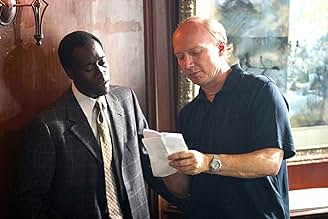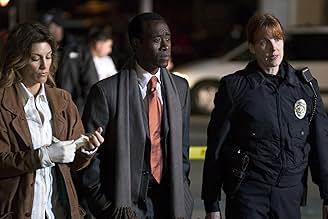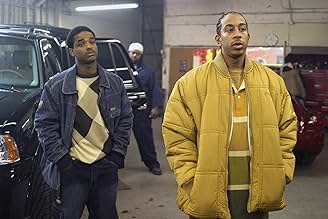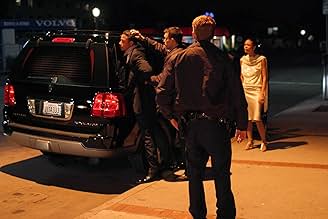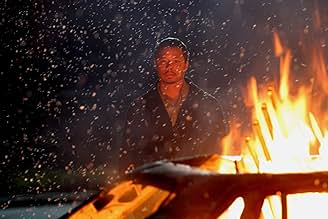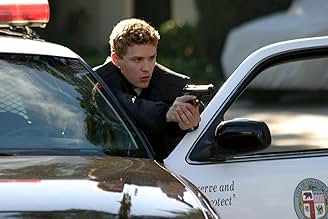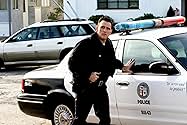Racial tensions collide in a collection of intertwined stories involving residents of Los Angeles.Racial tensions collide in a collection of intertwined stories involving residents of Los Angeles.Racial tensions collide in a collection of intertwined stories involving residents of Los Angeles.
- Won 3 Oscars
- 66 wins & 112 nominations total
Thandiwe Newton
- Christine
- (as Thandie Newton)
Sean Cory
- Motorcycle Cop
- (as Sean Cory Cooper)
Eddie J. Fernandez
- Officer Gomez
- (as Eddie Fernandez)
Featured reviews
Take the pop-cultured infused socio-political discourse of a Spike Lee movie, the glossy grit of a Michael Mann LA crime story, and the compelling mosaic story-telling technique of a Paul Thomas Anderson film, and you'll get the "feel" for Paul Haggis' stunning directorial debut. To boil a film like "Crash" down to such terms, however, would do it severe injustice. Powerful and thought provoking, this is the most accomplished and compelling film since "21 Grams" premiered back at the end of 2003.
"Crash" brilliantly shows through intertwining vignettes, that are often blazingly funny in their brutal honesty and fascinatingly gut-wrenching in their melodrama, how subtle racism (often guised in nervous humor) and overt prejudice (often exasperated by sudden irrational violence and an overabundance of readily available firearms) completely permeate our culture and everyday interactions within society. A hyper intelligent script showcases not characters, but brilliant representations of real people, people we know and pass in the street every day, people not unlike us. People who at first seem to be lost causes in the war against racism (witnessed in Matt Dillon's harried beat cop and Sandra Bulluck's spoiled District Attorney's wife) can often become the most unlikely solutions to the problem, while people who ride in on their high horse (witnessed in Ryan Phillipe's noble young police officer) can turn against the tide in the blink of an eye. No one is immune to it no matter how hard they try to rise above it (witnessed in Don Cheadle's quietly tragic detective).
In the end, everyone is flawed, the racism is inescapable, and the audience feels a twinge of sympathy for just about everyone. Perhaps that is what Haggis is hinting at to be our answer. Showing empathy and being able to relate even on the most remote level to every human being out there is the first step to that true brotherhood of man. Because the film offers no real solution, the discussion and discourse it creates in the minds of the viewers is the first step in solving society's ills. We can't tackle everything at once, but we can open a dialogue, and hopefully, one person conversing with another will be the first step to our salvation. It takes a bold film to raise such questions, and an even greater one to compel an audience to talk about the potential answers, and that is exactly what "Crash" accomplishes.
"Crash" brilliantly shows through intertwining vignettes, that are often blazingly funny in their brutal honesty and fascinatingly gut-wrenching in their melodrama, how subtle racism (often guised in nervous humor) and overt prejudice (often exasperated by sudden irrational violence and an overabundance of readily available firearms) completely permeate our culture and everyday interactions within society. A hyper intelligent script showcases not characters, but brilliant representations of real people, people we know and pass in the street every day, people not unlike us. People who at first seem to be lost causes in the war against racism (witnessed in Matt Dillon's harried beat cop and Sandra Bulluck's spoiled District Attorney's wife) can often become the most unlikely solutions to the problem, while people who ride in on their high horse (witnessed in Ryan Phillipe's noble young police officer) can turn against the tide in the blink of an eye. No one is immune to it no matter how hard they try to rise above it (witnessed in Don Cheadle's quietly tragic detective).
In the end, everyone is flawed, the racism is inescapable, and the audience feels a twinge of sympathy for just about everyone. Perhaps that is what Haggis is hinting at to be our answer. Showing empathy and being able to relate even on the most remote level to every human being out there is the first step to that true brotherhood of man. Because the film offers no real solution, the discussion and discourse it creates in the minds of the viewers is the first step in solving society's ills. We can't tackle everything at once, but we can open a dialogue, and hopefully, one person conversing with another will be the first step to our salvation. It takes a bold film to raise such questions, and an even greater one to compel an audience to talk about the potential answers, and that is exactly what "Crash" accomplishes.
"Crash" is a complex movie with a simple premise: set in Los Angeles it follows 8 main characters (and many, many more supporting) from all walks of life and races whose lives intersect at some point during one 24 hour period. These people are all different yet all alienated, to the point of breaking, so much so that when they come together, things explode.
The complexity of the film comes from the encounters between characters and their tangled lives and worlds. Haggis' screenplay is so intricate and delicately written I couldn't begin to try to summarize the actual plot line (which destines this article to be kind of vague), but everyone meets everyone else at some point in the film (and there are a whole lot of characters). Sufficed to say these meetings are variably intense, casual, fleeting, dangerous, but they all effect the participants in profound and provocative ways, causing lives to find enlightenment or swerve violently, and watching it all unfold is mesmerizing because Paul Haggis (Oscar Nominated writer of Million Dollar Baby) made the film meaty with messy characters and topics and stories to chew and hurtle along with.
The all-encompassing theme of the film is racism, and it is dealt with bluntly, honestly, and without reservation. Every single character participates in the perpetuation of the ugly cycle but also suffers because of it. Where racism makes for an interesting enough subject for an already provoking and fairly experimental film (I was surprised to see this get wide release), it's only the catalyst for a deeper, resounding story of redemption and the universality of our lonely situation which the movie becomes during its second hour (what you could call Act II). It switches from a somewhat depressing contemplative amalgamation of moments about racism in everyday life and how destructive it is, to a throbbing, intense web of choices and consequences -- life and death, vivifying or soul killing -- and the chance at redemption.
Following their actions in Act I, everyone meets a fork in the road or is given a second chance of some sort. Some take it, some don't, but regardless, by the end of the movie everyone has changed. This is what gives the movie wings during its second hour, makes it interesting, keeps you guessing and on knife's-edge. It also gives the characters depth and souls and shows that despite perceived and upheld differences, when it comes down to it we aren't different (which we see in a shattering scene between Ryan Philippe and Larenz Tate after Tate notices that he and Philippe have the same St. Christopher statue), in fact we desperately need each other. It's one of the few films I've seen where everyone is at fault somehow and yet there are no villains. It makes it hopeful, particularly with something as ugly as racism: everyone's fallible, but everyone has the capacity for good and nobility. That said, each of these character's inner struggles makes for all the conflict and resolution you need.
A talented ensemble drives the film, sharing almost equal amounts of screen time, but the folks who really stood out and had my full attention each time were Terrence Howard (plays a TV director), Matt Dillon (as a patrol cop), Sandra Bullock (a rich housewife), , Don Cheadle (a detective), and Michael Peña (a locksmith). These five gave deeply, deeply felt performances portraying a wide range of emotions and personal situations, giving souls -- alone, yearning, and searching in a world that doesn't seem to care -- to shells of imperfect people. But the actors triumph in little moments of human contact: a glance, an embrace, a pause, a smile, a wince, things that breath the film to life and with simple visuals give it profundity. This is beautifully illustrated in a small scene between the downward spiraling Jean (Sandra Bullock) and her maid after she's begun to realize all her problems may not be about the two black guys who car jacked her, but her own life.
Some closing notes: it's obvious it's a debut. At times the dialogue and acting can be stilted and unnatural; some of the initial "racial" situations seem forced; certain scenes could have used some editing or fine tuning, but by the end I didn't care. It also may be helpful to know that the first hour spends its time setting everything up for Act II, although it will seem more like a photo essay on racism than a setup. But by the time Act I ends you're ready for something substantial to happen, and at the perfect moment, stuff happens. I was entirely satisfied with this movie, I couldn't have asked for anything more. Still it's impressive, with his debut Haggis made a film that magically maintains a storytelling balancing act about people's lives that almost seamlessly flows, takes an honest look at racism with an understanding of mankind, a belief in redemption, and even hope. As I walked out of the theater into the rainy night it resonated with me and colored my thoughts as I made my way through the crowds of unknown fellow people filling the cinema. That's about all I can ask for in a film.
The complexity of the film comes from the encounters between characters and their tangled lives and worlds. Haggis' screenplay is so intricate and delicately written I couldn't begin to try to summarize the actual plot line (which destines this article to be kind of vague), but everyone meets everyone else at some point in the film (and there are a whole lot of characters). Sufficed to say these meetings are variably intense, casual, fleeting, dangerous, but they all effect the participants in profound and provocative ways, causing lives to find enlightenment or swerve violently, and watching it all unfold is mesmerizing because Paul Haggis (Oscar Nominated writer of Million Dollar Baby) made the film meaty with messy characters and topics and stories to chew and hurtle along with.
The all-encompassing theme of the film is racism, and it is dealt with bluntly, honestly, and without reservation. Every single character participates in the perpetuation of the ugly cycle but also suffers because of it. Where racism makes for an interesting enough subject for an already provoking and fairly experimental film (I was surprised to see this get wide release), it's only the catalyst for a deeper, resounding story of redemption and the universality of our lonely situation which the movie becomes during its second hour (what you could call Act II). It switches from a somewhat depressing contemplative amalgamation of moments about racism in everyday life and how destructive it is, to a throbbing, intense web of choices and consequences -- life and death, vivifying or soul killing -- and the chance at redemption.
Following their actions in Act I, everyone meets a fork in the road or is given a second chance of some sort. Some take it, some don't, but regardless, by the end of the movie everyone has changed. This is what gives the movie wings during its second hour, makes it interesting, keeps you guessing and on knife's-edge. It also gives the characters depth and souls and shows that despite perceived and upheld differences, when it comes down to it we aren't different (which we see in a shattering scene between Ryan Philippe and Larenz Tate after Tate notices that he and Philippe have the same St. Christopher statue), in fact we desperately need each other. It's one of the few films I've seen where everyone is at fault somehow and yet there are no villains. It makes it hopeful, particularly with something as ugly as racism: everyone's fallible, but everyone has the capacity for good and nobility. That said, each of these character's inner struggles makes for all the conflict and resolution you need.
A talented ensemble drives the film, sharing almost equal amounts of screen time, but the folks who really stood out and had my full attention each time were Terrence Howard (plays a TV director), Matt Dillon (as a patrol cop), Sandra Bullock (a rich housewife), , Don Cheadle (a detective), and Michael Peña (a locksmith). These five gave deeply, deeply felt performances portraying a wide range of emotions and personal situations, giving souls -- alone, yearning, and searching in a world that doesn't seem to care -- to shells of imperfect people. But the actors triumph in little moments of human contact: a glance, an embrace, a pause, a smile, a wince, things that breath the film to life and with simple visuals give it profundity. This is beautifully illustrated in a small scene between the downward spiraling Jean (Sandra Bullock) and her maid after she's begun to realize all her problems may not be about the two black guys who car jacked her, but her own life.
Some closing notes: it's obvious it's a debut. At times the dialogue and acting can be stilted and unnatural; some of the initial "racial" situations seem forced; certain scenes could have used some editing or fine tuning, but by the end I didn't care. It also may be helpful to know that the first hour spends its time setting everything up for Act II, although it will seem more like a photo essay on racism than a setup. But by the time Act I ends you're ready for something substantial to happen, and at the perfect moment, stuff happens. I was entirely satisfied with this movie, I couldn't have asked for anything more. Still it's impressive, with his debut Haggis made a film that magically maintains a storytelling balancing act about people's lives that almost seamlessly flows, takes an honest look at racism with an understanding of mankind, a belief in redemption, and even hope. As I walked out of the theater into the rainy night it resonated with me and colored my thoughts as I made my way through the crowds of unknown fellow people filling the cinema. That's about all I can ask for in a film.
Like Altman's classic Short Cuts, and Anderson's Magnolia, Crash, by writer/director Paul Haggis weaves a tale of multiple characters through the web of streets we have come to know as Los Angeles. Unlike those other two films this one has a very specific theme to explore. From the opening line uttered by Don Cheadle we know this is to be a film about how people relate, and from the interchange that follows between Jennifer Esposito and Alexis Rhee (pretty sure she plays the Korean female driver who rear-ended her) how people relate tends to be ruled by first impressions or prejudice.
Race is paramount in this film, and all our preconceptions of who people are get twisted and turned through the intricate plot. With each new additional character we find another assumption, another stereotype, and then watch as that preconception is obliterated as the character develops. It is a credit to the deftly written script, tight direction and exceptional acting talent that every one of these many characters is fully realized on screen without ever feeling one-dimensional.
I would love to discuss some of the details of what happens to explain how well it is done, but part of the magic of this film is allowing yourself to be taken on this ride. Mind you, this isn't a ride of pleasure. The first half of this film is unrelentingly in its ferociousness. I could literally feel my rage at some of the characters forming to a fever pitch. The fear and hatred I was confronting wasn't just on the screen, but in the pit of my stomach. And in one absolutely brilliant moment I was literally sobbing at the expectation of horror unfolding, only to be cathartically released in a most unexpected way.
Mr. Haggis was in attendance at the screening I saw and explained that the idea for this film came to him one night sometime after 9/11 at about 2a.m. when his own memories of a car- jacking experience from 10 years before wouldn't leave him alone. Clearly this film was his way of relieving those demons of memory, using the catharsis of his art to unleash them and in doing so has given to all viewers of cinema an opportunity to examine our own preconceptions about race relations and how we treat each other and think of ourselves. He mentioned in the discussion after-wards that he likes to make films that force people to confront difficult issues. Films that ask people to think after the film has ended and not just leave saying: "that was a nice film".
This isn't a "nice" film, and I would expect that it will provoke many a discussion in the ensuing weeks when it opens nation-wide. It's a discussion long overdue for this country, and it took a Canadian to bring the issue to the fore in this brilliant, thought provoking film.
Race is paramount in this film, and all our preconceptions of who people are get twisted and turned through the intricate plot. With each new additional character we find another assumption, another stereotype, and then watch as that preconception is obliterated as the character develops. It is a credit to the deftly written script, tight direction and exceptional acting talent that every one of these many characters is fully realized on screen without ever feeling one-dimensional.
I would love to discuss some of the details of what happens to explain how well it is done, but part of the magic of this film is allowing yourself to be taken on this ride. Mind you, this isn't a ride of pleasure. The first half of this film is unrelentingly in its ferociousness. I could literally feel my rage at some of the characters forming to a fever pitch. The fear and hatred I was confronting wasn't just on the screen, but in the pit of my stomach. And in one absolutely brilliant moment I was literally sobbing at the expectation of horror unfolding, only to be cathartically released in a most unexpected way.
Mr. Haggis was in attendance at the screening I saw and explained that the idea for this film came to him one night sometime after 9/11 at about 2a.m. when his own memories of a car- jacking experience from 10 years before wouldn't leave him alone. Clearly this film was his way of relieving those demons of memory, using the catharsis of his art to unleash them and in doing so has given to all viewers of cinema an opportunity to examine our own preconceptions about race relations and how we treat each other and think of ourselves. He mentioned in the discussion after-wards that he likes to make films that force people to confront difficult issues. Films that ask people to think after the film has ended and not just leave saying: "that was a nice film".
This isn't a "nice" film, and I would expect that it will provoke many a discussion in the ensuing weeks when it opens nation-wide. It's a discussion long overdue for this country, and it took a Canadian to bring the issue to the fore in this brilliant, thought provoking film.
I do not want to do an in-depth analysis of this film. Rather, I'll point out what I consider makes it a very poor effort: the script. The same guy who did the script for CRASH also did the script for MILLION DOLLAR BABY. Both won the Oscar for best picture. I must be pretty out of touch to criticize this guy, but here goes. The main problem is that every character is "invented". That is, each character is so obviously the product of a fertile (and I am using that word kindly) imagination. In CRASH the politician and his wife are absolute stereotypes. They speak the most inane lines, like from a comic book or low-grade soap opera. The two cops are similarly contrived. One is a good guy and one is a bad guy. One is an idealist. One is a cynical veteran. I imagine such categories of cops do exist, but to give them life it takes someone who knows the genres, like Joseph Wambaugh. (In fact, to see how really bad CRASH is, just compare it to THE ONION FIELD). We also have the two foul-mouthed gang-banging black youth, hell bent on insanity. Big deal. Anyone can produce such characters. There is the misunderstood, good-guy Mexican plumber, who just happens to love his young daughter oh so much. Etc. Etc. Each character has the depth of a comic-book creation. They all speak in litanies of clichés. The plot too is just a clever manage of intersections. It is so obviously the product of the next cup of coffee or cigarette. It is cleverness without depth or substance. Christ, that this film won best picture just begs belief.
While I am getting in my two cents here, MILLION DOLLAR BABY is the same cliché-riddled mess. It is obvious that the guy who wrote knew nothing about boxing. The characters are pathetic, lifeless creations.
What has Hollywood come to that such movies walk away with top prize?
While I am getting in my two cents here, MILLION DOLLAR BABY is the same cliché-riddled mess. It is obvious that the guy who wrote knew nothing about boxing. The characters are pathetic, lifeless creations.
What has Hollywood come to that such movies walk away with top prize?
Crash is in essence a glossed up remake of Grand Canyon. The premise is the same: a racially diverse group of people in Los Angeles who live separate lives are thrown together by coincidence. But for these coincidences, their lives would never intersect. Every interaction in Crash is racial in a way that hits the audience over the head with the movie's theme. Racism in Crash is a matter of not being treated with sensitivity. People are meant to endure the "tryanny" of being insulted. The people in Crash, like Grand Canyon, live lives of unremitting grimness that seems gratuitous. The movie suggests that if only people would be more racially sensitive, life would not be so grim. The oppression of having to actual endure racial insensitivity is unintentionally juxtaposed with lives that don't seem that bad. I definitely got the impression that the film writer (who can stand in for most of the Hollywood establishment) projects his own personal racial isolation on the world at large. This accounts for the film's superficial take on the subject. People who actually interact with people from other racial and socio-economic backgrounds know that life is not so gratuitously race-obsessed. The Magnolia-like editing of the film means that the characterizations in the film are not nuanced. We see only a sliver of their lives. The one exception is Dillon's character, but none of the other actors did anything remarkable. The film does have some decent plot twists. The film is well done, but is style over substance. A decent film, but not an Oscar-worthy one.
Oscars Best Picture Winners, Ranked
Oscars Best Picture Winners, Ranked
See the complete list of Oscars Best Picture winners, ranked by IMDb ratings.
Did you know
- TriviaPaul Haggis holds the distinction of being the only person ever to write the screenplay for two consecutive Best Picture winners. He also wrote the previous year's Best Picture winner, Million Dollar Baby (2004).
- GoofsPartway through Officer Ryan's rescue of Christine from her overturned SUV, the camera ran out of film, as evidenced by film sprocket holes appearing in the frame. This is an acknowledged goof from director Paul Haggis.
- Quotes
[first lines]
Graham: It's the sense of touch. In any real city, you walk, you know? You brush past people, people bump into you. In L.A., nobody touches you. We're always behind this metal and glass. I think we miss that touch so much, that we crash into each other, just so we can feel something.
- Crazy creditsProducers gratefully acknowledge the valuable assistance of The Culbert Family; Members of the Actors Gym, Hollywood, California.
- Alternate versionsThe two-disc director's cut DVD features an additional two minutes of dialogue and footage
- ConnectionsFeatured in 'Crash' Featurette (2005)
- SoundtracksCity of Angel
Written by Sungsoo Kim
Published by Nirvana Music
Performed by Sungsoo Kim
Courtesy of Cats Records
Details
- Release date
- Countries of origin
- Official site
- Languages
- Also known as
- Alto impacto
- Filming locations
- 3500 S. Gaffey Street, San Pedro, Los Angeles, California, USA(overturned car accident)
- Production companies
- See more company credits at IMDbPro
Box office
- Budget
- $6,500,000 (estimated)
- Gross US & Canada
- $54,580,300
- Opening weekend US & Canada
- $9,107,071
- May 8, 2005
- Gross worldwide
- $98,410,061
- Runtime
- 1h 52m(112 min)
- Color
- Sound mix
- Aspect ratio
- 2.35 : 1
Contribute to this page
Suggest an edit or add missing content


